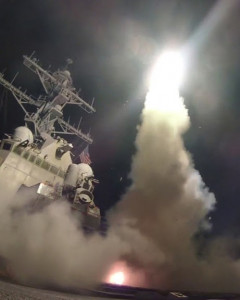

"Let's not forget that serious questions were happening in the media as well as serious congressional oversight and investigation in the possibility of the Trump campaign being in cahoots with Russia."
On April 6, President Trump launched 59 Tomahawk cruise missiles to attack a Syrian government air base in response to reports that Damascus had authorized an attack on civilians with a chemical nerve agent that killed more than 80 men, women and children, and injured hundreds of others. While Syria and Russia say the Syrian air force was not responsible for the attack, G-7 nations have called for an independent investigation by the organization for the prohibition of chemical weapons. The U.S. missile strike, the first targeting the government of Bashar al-Assad, was greeted by many in the U.S. media with an orgy of praise – and declarations that Trump had now truly become the U.S. commander-in-chief.
But for many analysts, the decision to attack the Syrian air base, where the Pentagon says the chemical attack originated, was more of a symbolic gesture than any substantive change in U.S. policy on the Syrian civil war. Because the Russians and Syrians were given advance notice of the attack, there was little serious damage to Syria’s capacity to wage an air war against rebels. And the attack did nothing to paper over the Trump administration’s many contradictions in its policy toward the Syrian conflict. Just days before the chemical attack, Trump and his Secretary of State Rex Tillerson declared that Washington was no longer pursuing regime change in Syria. But the administration’s views on this are now very different, depending on which official is asked.
Because the U.S. airstrikes in Syria, ordered without congressional authorization, distracted the nation from the many ongoing scandals faced by the unpopular Trump White House, there’s a suspicion that this may have played a role in the administration’s decision to use military force. Between The Line’s Scott Harris spoke with Paul Kawika Martin, communications and political director with Peace Action, who examines President Trump's decision to launch the missile strike, the ongoing carnage of the Syrian civil war and the international cooperation necessary to end it.
Paul Kawika Martin, Communications and political director with Peace Action; Jane Eyes of CT League of Women Voters, State Rep Matt Lesser of Middletown & Debra Torres; March For Science Calls on Legislators to Enact Evidence-Based Policies in the Pu


